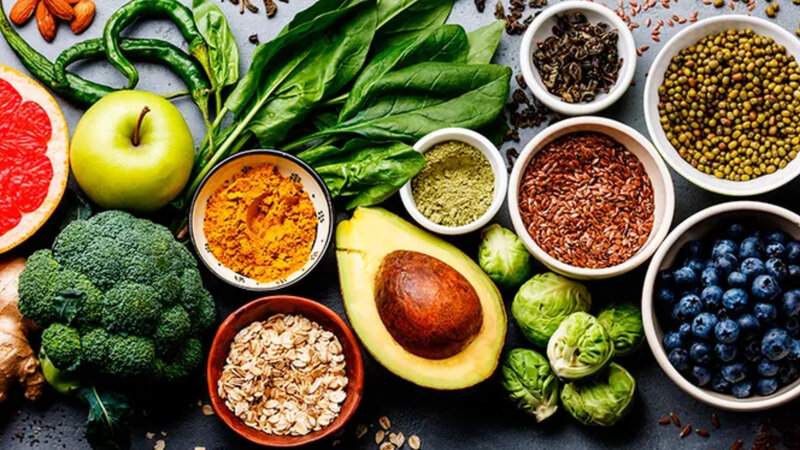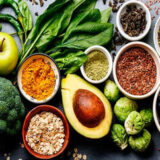Fruits And Vegetables For Mental Health
Fruits and vegetables offer various health benefits that can positively impact mental health. They are generally low in calories and high in fiber, which can help regulate blood sugar levels and provide a steady release of energy throughout the day. 
This can be particularly beneficial for maintaining stable moods and preventing mood swings caused by blood sugar fluctuations. A well-balanced diet that includes a variety of fruits and vegetables is essential for maintaining good mental health.
While no single fruit or vegetable can guarantee mental well-being on its own, certain ones are known to contain nutrients that can support brain health and potentially contribute to a positive mood.
By incorporating a diverse range of fruits and vegetables into your diet, you can provide your body with the necessary vitamins, minerals, antioxidants, and phytochemicals that promote overall mental and physical well-being.
Why are fruits and vegetables important in our daily diet?
Foods are rich in antioxidants
Many fruits and vegetables are rich in antioxidants, which help protect the brain from oxidative stress and inflammation. Oxidative stress occurs when there is an imbalance between harmful free radicals and the body’s antioxidant defenses.
Prolonged oxidative stress can lead to damage to brain cells and is believed to be a contributing factor in mental health conditions such as depression and cognitive decline.
By consuming fruits and vegetables rich in antioxidants, you can support brain health and potentially reduce the risk of these conditions.
Foods Are Rich In Nutrients And Fiber
Specific nutrients found in fruits and vegetables play a vital role in brain function and mood regulation. For example, folate, which is abundant in leafy greens and citrus fruits, is necessary for the synthesis of neurotransmitters like serotonin, dopamine, and norepinephrine.
These neurotransmitters are involved in regulating mood, emotions, and overall mental well-being. Deficiencies in folate have been linked to an increased risk of depression and other mental health disorders.
Foods Are Rich In Omega-3 Fatty Acids
Omega-3 fatty acids, found in foods such as avocados, walnuts, and pumpkin seeds, are essential for optimal brain function.
They contribute to the structure and function of brain cell membranes and have anti-inflammatory properties. Research suggests that omega-3 fatty acids may help reduce symptoms of depression, and anxiety, and improve cognitive function.
Foods Are Rich In Vitamins And Minerals
Additionally, vitamins and minerals found in fruits and vegetables play important roles in mental health. Vitamin C, found in citrus fruits and bell peppers, is not only an antioxidant but also supports the production of neurotransmitters and helps combat stress.
Vitamin A, present in carrots and sweet potatoes, is involved in the growth and development of the brain and may help improve cognitive function.
Magnesium, found in leafy greens and pumpkin seeds, is crucial for the regulation of mood and has a calming effect on the nervous system.
Fruits And Vegetables For Mental Health
It’s important to note that mental health is a complex issue influenced by various factors, including genetics, environment, lifestyle, and overall health.
While consuming fruits and vegetables is beneficial, it should be part of a holistic approach to mental well-being. Regular exercise, sufficient sleep, stress management techniques, social connections, and seeking professional help, when needed, are also important aspects of maintaining good mental health.
The best fruits and vegetables for mental health
Eating a well-balanced diet that includes a variety of fruits and vegetables is important for overall mental and physical health.
While no single fruit or vegetable can guarantee mental well-being, certain ones are known to contain nutrients that can support brain health and potentially contribute to a positive mood. Here are some fruits and vegetables that are often considered beneficial for mental health:
1. Berries: Blueberries, strawberries, raspberries, and blackberries are rich in antioxidants and vitamins that may help protect the brain from oxidative stress and inflammation.
2. Leafy greens: Spinach, kale, Swiss chard, and other leafy greens are excellent sources of folate and magnesium, which are important for maintaining good mental health. Folate helps in the production of neurotransmitters like serotonin, dopamine, and norepinephrine, which regulate mood.
3. Avocados: Avocados are packed with healthy fats, including omega-3 fatty acids. These fats are essential for brain health and may help improve cognitive function and mood.
4. Citrus fruits: Oranges, lemons, and grapefruits are high in vitamin C, which is known to support mental health by reducing symptoms of stress and boosting the immune system.
5. Bananas: Bananas are a good source of tryptophan, an amino acid that helps produce serotonin. Serotonin is a neurotransmitter that plays a key role in mood regulation.
6. Cruciferous vegetables: Broccoli, cauliflower, Brussels sprouts, and cabbage are rich in vitamins, minerals, and antioxidants that support brain health and reduce inflammation.
7. Tomatoes: Tomatoes contain lycopene, an antioxidant that has been associated with a reduced risk of depression. They are also a good source of vitamins A and C.
8. Sweet potatoes: Sweet potatoes are rich in beta-carotene, which the body converts to vitamin A. Vitamin A is important for brain function and can support overall mental well-being.
9. Dark Chocolate: While technically not a fruit or vegetable, dark chocolate (with a high cocoa content) contains flavonoids and antioxidants that can improve mood and cognitive function. It may also increase blood flow to the brain.
10. Bell Peppers: Bell peppers, especially the red and yellow varieties, are rich in vitamin C and antioxidants. They can help reduce oxidative stress and inflammation, which may have a positive impact on mental health.
11. Pumpkin Seeds: Pumpkin seeds are a great source of magnesium, iron, zinc, and omega-3 fatty acids. These nutrients support brain function, improve mood, and reduce symptoms of anxiety and depression.
12. Walnuts: Walnuts are packed with omega-3 fatty acids, antioxidants, and vitamin E. They have been linked to improved cognitive function and a reduced risk of depression.
13. Pineapple: Pineapple contains bromelain, an enzyme that has been associated with increased serotonin levels in the brain. Serotonin is often referred to as the “feel-good” hormone.
14. Asparagus: Asparagus is a natural source of folate, a nutrient that plays a crucial role in neurotransmitter production and regulation of mood. It also contains prebiotic fiber, which can support a healthy gut-brain connection.
15. Beetroot: Beetroot is rich in nitrates, which have been shown to improve blood flow to the brain. It may enhance cognitive function and potentially help reduce the risk of mental decline.
16. Citrus fruits: Apart from vitamin C, citrus fruits like lemons, oranges, and grapefruits also contain flavonoids, which have been associated with improved cognitive function and a reduced risk of cognitive decline.
17. Carrots: Carrots are high in beta-carotene, which the body converts to vitamin A. Vitamin A is important for brain health and may help enhance cognitive function.
18. Turmeric: Although technically a spice, turmeric contains a compound called curcumin, which has potent anti-inflammatory and antioxidant properties. It may have a positive impact on brain health and potentially alleviate symptoms of depression.
Note:
Remember, while these fruits and vegetables have potential mental health benefits, they should be part of a well-rounded diet along with other nutrient-rich foods.
A balanced diet that includes a wide variety of fruits, vegetables, whole grains, lean proteins, and healthy fats is key for maintaining optimal mental health.
It’s also important to consult with a healthcare professional for personalized advice based on your specific needs and dietary requirements.
























